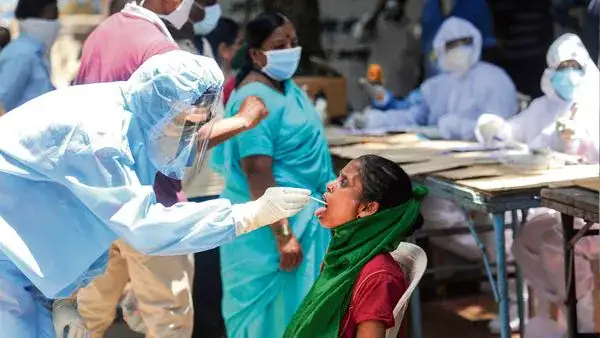COVID-19 Cases Rise in Delhi: 104 Active Infections, 99 Recorded This Week
After months of low COVID-19 activity, Delhi has started to report a noticeable rise in infections. The capital currently has 104 active cases, with 99 of them emerging within the past week. According to the central COVID-19 dashboard, India now has 1,009 active cases across the country.

Delhi’s Sudden Spike Raises Alarms
Delhi’s health department has confirmed the recent increase and is closely monitoring the situation. Though the numbers are still low compared to previous waves, the sudden rise has caught attention. In just seven days, 99 people in the city tested positive for the virus, signaling that COVID-19 still lingers.
Most of the infected individuals are experiencing mild symptoms and are recovering at home. Hospitals have not seen a surge in admissions, but doctors are urging residents to remain alert. Health officials believe the spike could result from seasonal changes or lower testing rates.
India’s National COVID-19 Status
The nationwide total of active cases has reached 1,009. States outside Delhi have reported scattered cases, but none have seen a similar sharp increase. The overall number remains manageable, yet health authorities aren’t ignoring the trend. They’ve started reviewing regional reports to assess whether the virus is spreading silently in other parts of the country.
Experts believe India’s high vaccination coverage and natural immunity are keeping serious illness under control. However, they’ve emphasized the need for continued testing and tracking.
Health Experts Share Their View
Medical experts believe the current situation doesn’t call for panic but deserves attention. Dr. Rajesh Malhotra, an infectious disease specialist, explained, “We’re not heading into another wave, but this uptick means the virus hasn’t disappeared. Urban areas like Delhi are always at higher risk because of dense populations.”
He also pointed out that older people and those with underlying health conditions should remain cautious. “Even though most cases are mild now, vulnerable individuals still face a higher risk,” he said.
Variants Continue to Evolve
The virus continues to mutate, which adds uncertainty to the situation. Although authorities have not confirmed a new variant in Delhi, scientists are watching developments carefully. The World Health Organization recently highlighted several Omicron sub-variants found in different parts of the world.
Virologist Dr. Neha Vyas commented, “Mutations are normal, and most don’t lead to major changes. But we still need to monitor them because some variants could spread faster or evade existing immunity.”
She added that regular genomic surveillance helps identify these changes early and gives health systems time to respond.
Should Precautions Make a Comeback?
While no new restrictions have been imposed, health professionals are urging people to return to basic preventive habits. Wearing masks in crowded indoor spaces, practicing hand hygiene, and avoiding unnecessary exposure remain effective strategies.
“People can protect themselves and others by making small lifestyle adjustments,” said Dr. Vyas. “Masks, ventilation, and distancing worked before—and they still do.”
Public transport, shopping malls, and cinemas are places where virus transmission could happen more easily. Doctors recommend extra caution in these spaces, especially during peak hours.
Vaccination Remains a Strong Shield
India’s successful vaccination drive has helped reduce hospitalizations and deaths. Over 2.2 billion doses have been administered across the country. Despite this, booster dose uptake has declined in recent months. Many people, especially younger ones, skipped their precautionary dose, thinking the risk had passed.
The Ministry of Health continues to encourage eligible individuals to get their boosters. Vaccines may not prevent infection entirely, but they significantly reduce the chances of severe illness.
Health centers in Delhi have already been instructed to stay prepared for a possible increase in testing or vaccination demands. Officials are reviewing supplies and staffing to ensure a quick response if the situation changes.
What Lies Ahead?
While the numbers don’t indicate a new wave, the recent developments are a reminder that COVID-19 is still with us. Health authorities have increased their surveillance efforts and are asking state governments to do the same. Testing, contact tracing, and genome sequencing may ramp up in the coming weeks to prevent widespread outbreaks.
Public cooperation will play a crucial role in keeping the numbers low. Many experts believe that with a bit of caution and preparedness, India can avoid another major surge.
Final Thoughts
The latest COVID-19 figures from Delhi show a small but significant rise in active cases. Although the health system remains stable and cases are mild, the virus’s return highlights the importance of staying alert.
Citizens are encouraged to continue practicing basic precautions and to complete their vaccinations. While life may feel normal again, the fight against COVID-19 isn’t completely over.
With continued awareness and support from both citizens and the government, India can manage these small flare-ups and protect those who remain vulnerable.






